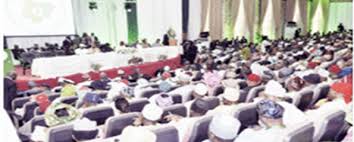Confab endorses University degree as requisite for Presidency, Gov, NASS, State Assembly, LG boss……Scraps SIEC
By Suleiman Bello
National Conference on Tuesday agreed that those aspiring to contest for the offices of the President, governor, National Assembly, state Assembly and local government chairman, should have a minimum of a university degree.
Delegates also voted in favour of the scrapping of the State Independent Electoral Commissions in the country.
The conference also agreed that May 29 should be scrapped as Democracy Day while election riggers should be banned from holding elective offices for 10 years.
Delegates’ action according to information was at variance with the recommendation of the Committee on Political Parties and Electoral Matters, which recommended that rather than scrapping the SIECs, efforts should be made to strengthen them to make them more effective, as well as improving their credibility.
It added that provision should be made for the financial independence of SIECs by giving them a first line charge in the state’s budget.
The report of the committee, which was chaired by a former Senate President, Dr. Iyorchia Ayu, also stated that the issues relating to the composition and administration of SIECs should be activated through a law of the State House of Assembly.
It added that, “State Houses of Assembly should legislate the details of the composition and administration of SIECs as well as confirm their members. State Houses of Assembly should legislate the tenure of elected local government officials.”
But delegates while going through the recommendations and amendments of the committee, argued that the state electoral commissions had become a tool of political intimidation in the hands of state governors.
Among the delegates who spoke in favour of the scrapping of SIEC’s was the National Chairman of the Labour Party, Chief Dan Nwanyanwu, who argued that it was impossible for the opposition to win local government elections in the states.
In some instances, he said that election results were already prepared in government houses and that elections were just mere formalities.
On electronic voting, the conference said that it should be suspended until after the 2015 general elections.
It also voted that the age of aspirants to the state Houses of Assembly should be reduced to 25 years.
The conference however rejected the recommendation that financial transactions of political parties should be done through the banks to encourage the cashless policy of the Federal Government.
It equally rejected the call for the introduction of option A4 to be used by political parties during primaries and during general elections.
It also agreed that those who have been found wanting to have contributed to electoral malpractices should be banned for 10 years before being qualified to contest elective or be appointed to public office.
The conference also stripped INEC the power of deregistering political parties, while it ruled that youth leaders of political parties should not be more than 35 years.
Other actions and recommendations taken by the delegates during their sitting were that those aspiring to contest for the offices of the President, governors, members of the National Assembly, state Houses of Assembly and local government chairmen, should have a minimum of first degree.
It was however agreed that the minimum academic qualification for local government councillors must be a minimum of secondary school certificate.
Though the conference outlawed defection, it however agreed that elected political office holders and members of the political parties that merged into one should be allowed to remain in their offices.
The delegates also voted against what it called militarisation of the polity.
With this, the conference was asking the government to stop sending the military for election monitoring.
The Deputy Chairman of the conference, Prof. Bolaji Akinyemi, however warned delegates not to blame government if there were crises during elections.
It was also agreed that those removed from office by the courts because of rigging or electoral offences should not be allowed to benefit from privileges of such offices.
With this development, former governors sacked by tribunals would cease from being revered to as former governors while privileges they hitherto enjoyed would be stopped.





